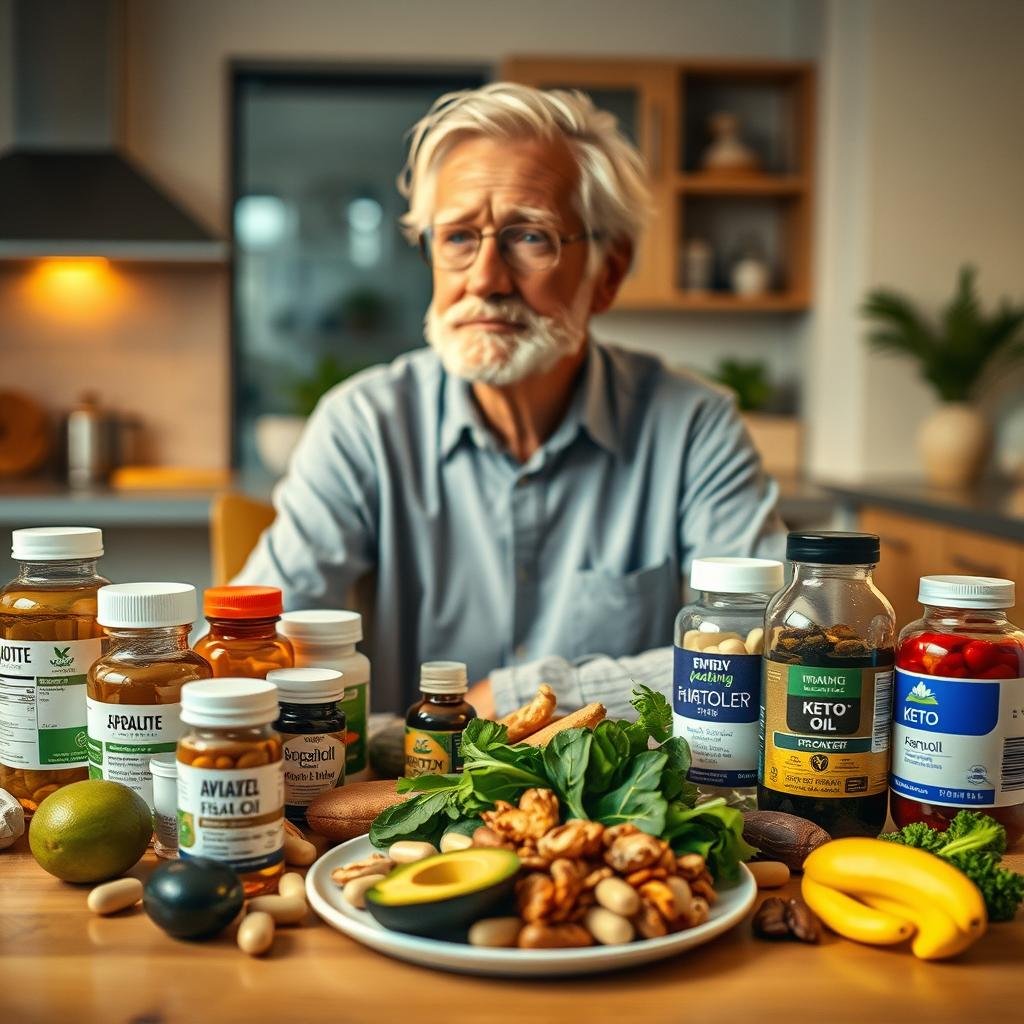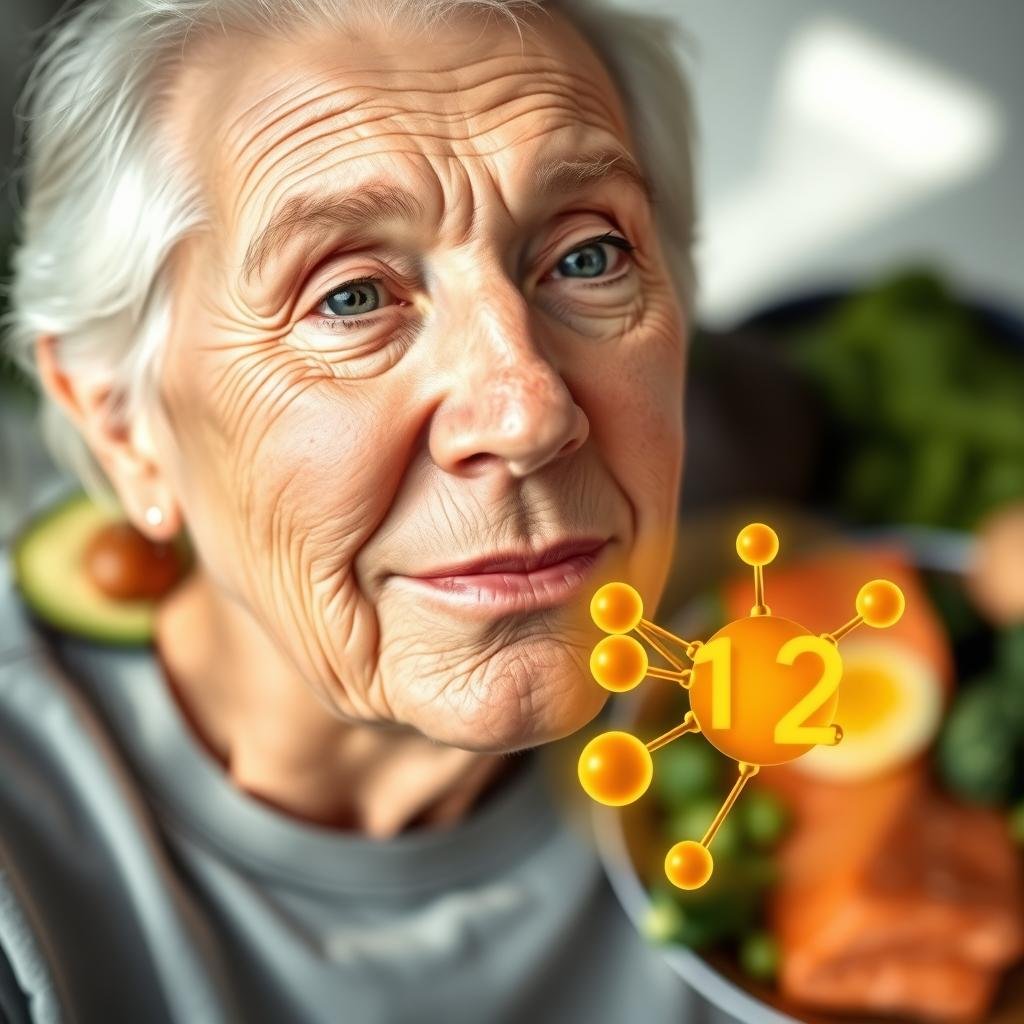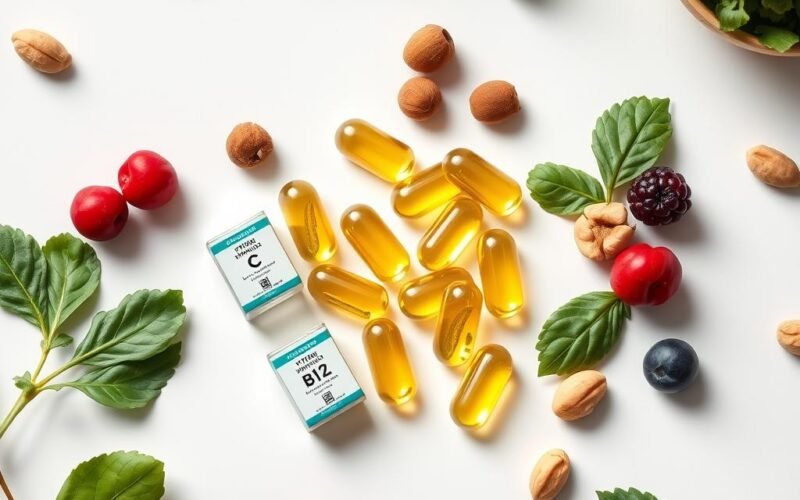Did you know over 80% of adults over 65 have nutrient deficiencies? This number goes up when they follow special diets. Getting the right vitamins for seniors is key on the ketogenic diet. Aging and diet restrictions can make it hard to get all the nutrients you need.
The ketogenic diet is popular among older adults for good reasons. It’s high in fat, moderate in protein, and low in carbs. This diet helps your body burn fat for energy instead of sugar. It can improve brain function, help with weight, and keep blood sugar stable.
But, the keto diet can make it hard to get some nutrients that seniors need. Feeling tired, getting muscle cramps, or feeling foggy might mean you’re not getting enough nutrients.
As we get older, our bodies have a harder time absorbing nutrients. Adding a diet that cuts out many food groups makes it even harder. Proper supplementation is a must to keep your health and energy up.
This guide will look at five key nutrients for your keto journey. With the right nutrition, you can enjoy ketosis’s benefits while meeting your health needs.
Key Takeaways
- Nutrient deficiencies affect most seniors and can worsen on restrictive diets like keto
- The ketogenic diet offers benefits for senior health including improved cognition and metabolism
- Common symptoms like fatigue and muscle cramps may indicate nutritional gaps, not aging
- Both aging and keto restrictions can compromise micronutrient intake
- Proper supplementation can help seniors thrive while maintaining ketosis
- Strategic nutrient planning is essential for long-term success on keto as an older adult
The Keto Diet and Micronutrient Needs for Seniors
Seniors on the ketogenic diet face unique challenges. This diet, high in fat and low in carbs, affects nutritional needs. It’s important to plan carefully, focusing on vitamins and minerals.
What is the Keto Diet and How Does it Affect Seniors?
The ketogenic diet is a low-carb, moderate-protein, high-fat plan. It changes your body’s energy source from glucose to fat. By cutting carbs to under 50 grams daily, your body enters ketosis, burning fat instead.
Seniors may see mental clarity, better blood sugar control, and less inflammation. It also helps with weight management, which gets harder with age.
But, seniors might find it harder to enter ketosis. Metabolism slows with age, making the transition longer and more uncomfortable. The diet’s food restrictions can also be tough, adding to existing dietary challenges.
The Critical Role of Vitamins for Seniors on Keto
Nutrients for seniors on keto are even more important. The diet excludes many vitamin-rich foods like whole grains, legumes, and fruits.
This can lead to nutritional gaps, which are risky for older adults. Seniors already face higher risks of deficiencies due to age-related changes in digestion and absorption. The keto diet can make these challenges worse.
Seniors need to pay extra attention to electrolytes, B vitamins, vitamin D, and calcium. Without supplements or careful food choices, they may face health issues.
Common Signs of Nutrient Deficiencies on Keto
Knowing the signs of nutrient deficiencies is key. Fatigue that lasts beyond the initial “keto flu” might mean you’re not getting enough B vitamins, like B12.
Muscle cramps, heart palpitations, dizziness, and headaches can be signs of electrolyte imbalances. These often happen during ketosis.
Constipation and brain fog that doesn’t improve could mean you’re missing omega-3 fatty acids. Hair loss, brittle nails, and slow-healing wounds are also warning signs of vitamin deficiencies.
These symptoms aren’t just side effects of keto. They’re signs that your diet needs a tweak. With the right food choices and supplements, seniors can enjoy keto’s benefits without these issues.
Support your nutrition alongside the senior keto grocery list and 7-day meal plan.
Why Seniors Need Extra Nutrient Support on a Ketogenic Diet
Older adults on keto need more nutritional help to stay healthy. The diet’s strict rules and age-related changes make it tough. Knowing these needs helps seniors enjoy ketosis’s benefits.
Age-Related Changes in Nutrient Absorption
As we get older, our bodies change how they handle nutrients. After 60, we make less stomach acid, making it harder to absorb essential vitamins and minerals. This affects B12, calcium, and iron the most.
The lining of our intestines also gets less efficient with age. This makes vitamin absorption in elderly people harder. Plus, many seniors take meds that can mess with nutrient uptake.
Our gut’s balance of bacteria changes with age, affecting digestion and nutrient extraction. This makes it key for seniors to focus on nutrition, no matter their diet.

How Keto Affects Micronutrient Levels
The keto diet limits foods that are rich in nutrients, like fruits and whole grains. This reduces intake of B vitamins, potassium, and fiber. These are important for age-related vitamin needs.
The diet also leads to more water loss, which can lose important electrolytes. For seniors, this is a big challenge. They need to plan their nutrients carefully for senior keto nutrition.
Switching to fat as a main fuel source changes how nutrients are used. This might increase the need for certain vitamins and minerals.
The Connection Between Nutrient Deficiencies and Keto Flu
Many people feel sick when starting keto, known as “keto flu.” For seniors, these symptoms can be worse and last longer. This is because they already have nutritional challenges.
Headaches, fatigue, and muscle cramps often come from not having enough electrolytes. Brain fog and irritability might mean they’re not getting enough fat-soluble vitamins or omega-3s. These are key for keto after 60 nutrients planning.
But, with the right food choices and supplements, seniors can skip these symptoms. Getting the right nutrients not only prevents keto flu but also boosts ketosis’s benefits for older bodies.
Vitamin D: The Sunshine Vitamin for Senior Bone Health
Vitamin D is key for seniors, even more so on a keto diet. It’s vital for bone health and helps keep seniors strong and full of life while on keto.
Why Vitamin D is Critical for Seniors on Keto
As we age, our body makes less Vitamin D. This problem gets worse on keto because many Vitamin D-rich foods are cut out.
Vitamin D helps our body use calcium, which is important for strong bones. Without enough, seniors are at risk of osteoporosis and breaking bones.
Vitamin D also boosts our immune system, muscles, and mood. For keto dieters, it can ease the “keto flu” and help the body switch to fat for energy.
Natural and Supplemental Sources of Vitamin D
While sunlight is the best source, many seniors can’t get enough. Just a bit of sun a few times a week isn’t enough.
Keto-friendly foods include:
- Fatty fish like salmon, mackerel, and sardines
- Egg yolks (from pasture-raised chickens)
- Beef liver and other organ meats
- Some mushrooms (exposed to UV light)
For most seniors, vitamin supplements are needed. Choose Vitamin D3 for better results. Liquid or softgel forms are easier to absorb.
Recommended Daily Intake for Seniors
Adults need 600 IU of Vitamin D daily, but seniors often need more. Experts say 800-1000 IU is best for those over 65. Some suggest up to 2000 IU for those with less sun or poor absorption.
On keto, where dairy and fortified foods are scarce, supplements are critical. Always talk to your doctor before starting, as needs vary.
Signs of Deficiency and Benefits of Optimal Levels
Look out for these signs of Vitamin D deficiency:
- Bone pain or tenderness
- Muscle weakness or cramping
- Fatigue and general malaise
- Increased susceptibility to infections
- Mood changes or depression
Having enough Vitamin D helps seniors on keto in many ways. It improves bone health, reduces fall risk, boosts the immune system, and may even help with blood sugar control.
Getting your Vitamin D levels checked is the best way to know if you need more. This is very important for seniors on keto, as it helps meet their nutritional needs.
Vitamin B12: Essential for Energy and Cognitive Function
Vitamin B12 is key for older adults on keto. It boosts neurological health and energy use. As we age, our bodies absorb B12 less well, making it vital to keep levels up.
The Role of B12 in Senior Health on Keto
Vitamin B12 is vital for turning fats into energy on keto. This is important for staying energetic all day.
For seniors, B12 helps keep nerves working well. It protects nerves, which is good for memory and thinking as we get older.

B12 also helps make red blood cells. This prevents anemia, which can make you feel weak and tired. It’s also important for fixing cells and making new ones.
Keto-Friendly Sources of Vitamin B12
Many B12-rich foods fit well with a keto diet. Animal products are the main sources:
– Organ meats, like liver, are high in B12
– Shellfish, such as clams and oysters, are also rich
– Fatty fish, like salmon and trout, offer B12 and omega-3s
– Eggs and cheese have some B12 and help with ketosis
Vegetarian seniors can use nutritional yeast with B12. But, many seniors need supplements because their bodies absorb B12 less well with age. Choose methylcobalamin or adenosylcobalamin for better absorption, and consider sublingual tablets for better results.
Recommended Daily Requirements for Older Adults
Adults need 2.4 micrograms of Vitamin B12 daily. But, seniors might need 25-100 micrograms because their bodies absorb it less. This is important on keto because the diet limits food choices.
Some things might make you need more B12:
– Taking certain medications
– Having had stomach surgery
– Certain health conditions
– Following a strict keto diet
Getting your B12 levels checked regularly is the best way to know if you need more. Levels below 350 pg/mL need attention, even if they’re within the normal range.
Symptoms of B12 Deficiency and Health Benefits
Spotting B12 deficiency early is key. Look out for these signs:
– Feeling very tired or weak
– Numbness or tingling in hands and feet
– Trouble remembering things or focusing
– Feeling moody or depressed
– Skin looking pale or yellowish
Having enough B12 helps seniors on keto in many ways. It boosts the immune system and keeps nerves and energy levels up. This is why B12 is so important for seniors on keto.
With enough B12, seniors can feel more energetic, have better nerve function, and stay mentally sharp. Regular checks and supplements help avoid the problems of not having enough B12.
Magnesium: The Mineral for Muscle Function and Energy
Magnesium is a key mineral for seniors on a ketogenic diet. It helps with energy and muscle health. Yet, many older adults struggle to keep enough magnesium in their bodies.
Why Magnesium Matters for Seniors Following Keto
Magnesium is involved in over 300 body functions. It’s more important for seniors as they age and absorb less. The keto diet can lower magnesium levels by limiting food sources and increasing urine loss.
When switching to fat for energy, the body loses important minerals like magnesium. This can cause muscle cramps, tiredness, and heart rhythm issues in seniors.
Best Food Sources and Supplement Forms
Many keto-friendly foods are rich in magnesium. Dark leafy greens, avocados, pumpkin seeds, and almonds are good sources. But, seniors might not get enough magnesium from food alone, making supplements a good option.
Choosing the right magnesium supplement is key. Magnesium glycinate is absorbed well and gentle on the stomach. Magnesium citrate is also good but might cause loose stools. Magnesium threonate is best for brain health as it crosses the blood-brain barrier.
Daily Magnesium Needs for Seniors
Seniors over 50 need 420mg of magnesium daily. On keto, they might need 400-500mg. Start with a small dose to avoid stomach issues.
Many senior multivitamins don’t have enough magnesium. Look for separate magnesium supplements if needed.
Deficiency Symptoms and Health Advantages
Signs of magnesium deficiency include muscle cramps, insomnia, and anxiety. These symptoms are often mistaken for aging or geriatric vitamin deficiencies. They can worsen during keto adaptation.
Having enough magnesium helps seniors in many ways. It boosts energy, improves sleep, and reduces muscle pain. It also supports heart health. Research shows it may lower blood pressure and prevent osteoporosis, important for older adults.
Always talk to your doctor before starting magnesium supplements. This is true if you’re on medications for heart or kidney issues. The right amount of magnesium can greatly improve a senior’s keto lifestyle.
Vitamin K2: The Overlooked Nutrient for Cardiovascular Health
Vitamin K2 is a key nutrient for seniors on a keto diet. It’s often overlooked but plays a big role in heart health. Unlike K1, K2 has unique functions that are more important as we get older, and even more so on a high-fat diet.
Understanding K2’s Role in Senior Health
Vitamin K2 helps control calcium in your body. It makes sure calcium goes to bones and teeth, not to arteries or organs. This is very important for seniors to avoid heart disease.
The keto diet helps your body absorb K2 better because it’s fat-soluble. But many seniors don’t get enough, which can lead to calcium problems.
K2 works well with vitamin D and calcium, which seniors often take. Without enough K2, these supplements can actually harm your heart by causing calcium buildup in arteries.

Keto-Compatible Sources of Vitamin K2
Many foods rich in K2 fit well with a keto diet:
- Grass-fed butter and ghee (best from spring and summer)
- Egg yolks from pasture-raised chickens
- Organ meats, like liver
- High-fat cheeses like Gouda, Brie, and Edam
- Fermented foods like natto and sauerkraut
For seniors who can’t eat enough K2-rich foods, supplements are a good option. There are two types: MK-4 and MK-7. MK-7 lasts longer in the blood and is often recommended for seniors.
Recommended Intake Levels
There’s no specific RDA for K2, but guidelines suggest 90-120mcg daily. This doesn’t distinguish between K1 and K2.
Research suggests seniors might need 100-200mcg of K2. Those with heart problems or osteoporosis might need more, under doctor’s advice.
The keto diet’s high fat helps your body absorb K2 better. This means even a little K2 can be very effective.
Signs of Inadequacy and Benefits of Sufficiency
K2 deficiency often doesn’t show symptoms until it’s too late. Early signs might include:
- Lower bone density despite calcium supplements
- Dental problems like cavities or weak teeth
- Stiffer or calcified arteries
- Easier bruising or longer bleeding times
Having enough K2 on a keto diet can greatly benefit seniors. It improves heart health, strengthens bones, and helps with dental and cognitive health. Some studies also suggest it can protect eye health by reducing calcium deposits.
For seniors on a keto diet, getting enough vitamin K2 is a simple yet powerful way to support their health and independence.
Omega-3 Fatty Acids: Brain and Heart Protection for Seniors
Seniors on the ketogenic diet find omega-3 fatty acids very helpful. They protect the brain and heart as we age. These fats are key for staying healthy, even on a high-fat diet like keto.
The Importance of Omega-3s for Aging Adults on Keto
As we get older, our bodies face more inflammation. This can hurt our brain and heart health. Omega-3 fatty acids offer strong anti-inflammatory effects, which are very important for seniors on keto diets.
The keto diet focuses on fats, so it’s important to choose the right ones. Many seniors eat too many omega-6 fatty acids without enough omega-3s. This can lead to inflammation.
Omega-3s are great for seniors. They keep cells healthy, support brain function, and fight off age-related brain decline. They also help the heart by keeping rhythm steady, lowering triglycerides, and keeping blood pressure in check.
Best Sources Compatible with Ketogenic Eating
Finding omega-3-rich foods for keto is easy with these great options:
- Fatty fish – Salmon, mackerel, sardines, and herring are full of omega-3s (EPA and DHA)
- Nuts and seeds – Walnuts, flaxseeds, and chia seeds have ALA, a plant-based omega-3 (though conversion to EPA/DHA is limited in seniors)
- Pasture-raised eggs – They have some DHA and fit well in keto diets
For those who don’t eat fatty fish often, supplements are key. Fish oil, krill oil, and algal oil (for vegetarians) offer EPA and DHA without carbs that might mess with ketosis.
Optimal Daily Amounts for Seniors
Health groups suggest 1,000-2,000mg of EPA and DHA daily for seniors. Those with heart issues or inflammation might need more.
Seniors on keto should aim for 1,500mg daily to balance omega-6s. This keeps the omega-3 to omega-6 ratio right for optimal brain health and less inflammation.
Remember, everyone’s needs are different. Health status, meds, and goals play a part. Talk to a doctor to find the right dose.
Deficiency Indicators and Health Benefits
Watch for these signs of omega-3 deficiency:
- Dry, flaky skin and brittle nails
- Joint pain and stiffness
- Difficulty concentrating or memory lapses
- Mood fluctuations or depression
- Fatigue or poor sleep quality
Keeping omega-3 levels up on keto is very beneficial. It helps the brain stay sharp, slows down mental decline, and boosts memory. Omega-3s also keep the heart healthy by reducing inflammation and improving cholesterol.
These fats also reduce joint pain, support eye health, and improve sleep. All these benefits add up to a better life for seniors on keto.
How to Choose Supplements Wisely for Senior Keto Dieters
Choosing supplements for seniors on a keto diet can be tough. With so many options, picking the right ones is key. Remember, the FDA doesn’t regulate supplements much, so your choices are even more critical.
Quality Markers for Vitamin Supplements
When picking vitamin supplements for aging adults, quality is first. Look for products with third-party testing like USP, NSF, or ConsumerLab. These checks ensure the product matches the label.
Good senior multivitamins should not have extra fillers or colors. They should clearly list what’s inside and how much. Trustworthy brands will share how they make and source their products.
- Choose supplements with the right doses for seniors
- Verify third-party testing certifications
- Avoid products with too many fillers or additives
- Select supplements from well-known brands
Understanding Bioavailability and Absorption
Not all vitamin supplements are the same in how well they’re absorbed. Bioavailability is key, as it affects how well your body uses nutrients. For example, methylcobalamin (B12) is better absorbed than cyanocobalamin in older adults.
Fat-soluble vitamins (A, D, E, and K) work best with keto-friendly fats. Chelated minerals, like magnesium glycinate, are easier for your body to use than oxide forms. Some supplements need specific timing or other nutrients to work best.
Potential Supplement Interactions with Medications
Many seniors take meds that can react with supplements. Vitamin K can mess with blood thinners, and calcium might affect thyroid meds. Always talk to your doctor before starting any supplements.
Keep a list of all your meds and essential nutrients for older adults you’re taking. Share this with all your healthcare providers to avoid bad interactions. Your pharmacist can also help spot possible problems.
When to Take Different Supplements for Maximum Benefit
When you take supplements matters. Fat-soluble vitamins and minerals like magnesium work best with meals that have healthy fats. Iron should be taken alone from calcium to avoid competition for absorption.
Some B vitamins might give you more energy in the morning. Magnesium can help you relax at night. Spread out your supplements to help your body absorb them better.
Remember, supplements should add to your diet, not replace it. The right ones can help with keto flu, boost nutrition, and support your health on the keto path.
Sample One-Day Keto Meal Plan Rich in Essential Vitamins for Seniors
A well-planned keto meal plan can be tasty and full of nutrients seniors need. It’s not about giving up nutrition; it’s about making every meal count. Each dish can help meet vitamin and mineral needs while keeping you in ketosis. Let’s look at a day of senior keto nutrition packed with essential nutrients.
Nutrient-Dense Breakfast Options
Begin with a spinach and cheese omelet. Use 2-3 eggs, fresh spinach, and 1 ounce of full-fat cheese. This combo gives you vitamin B12, vitamin D, and protein. Add sliced avocado and chia seeds for extra magnesium and healthy fats.
Another great choice is Greek yogurt with ground flaxseeds, berries, and MCT oil. It’s full of calcium, probiotics, and omega-3s. For a simple breakfast, try bulletproof coffee with grass-fed butter and MCT oil for energy.
Vitamin-Packed Lunch Ideas
For lunch, try a Mediterranean-style plate. Have canned wild sardines over arugula, olives, feta, and cucumber. This meal is rich in omega-3s, vitamin D, calcium, and potassium—key nutrients for seniors on keto.
Or, have a warm cup of bone broth with collagen powder and a side salad. The salad has mixed greens, avocado, and pumpkin seeds with olive oil and lemon. This supports joint health and gives you magnesium and protein.
Micronutrient-Rich Dinner Suggestions
For dinner, bake a 4-ounce wild-caught salmon with herbs and lemon. Serve it with roasted Brussels sprouts and cauliflower in olive oil. This meal is full of vitamin D, omega-3s, and antioxidants for elderly nutrition.
Another good dinner is grass-fed beef liver sautéed with onions and mushrooms, with steamed broccoli and butter. Liver is packed with iron, vitamin A, and B vitamins. Start with a small portion mixed with ground beef if you’re new to organ meats.
Healthy Keto Snacks for Filling Nutritional Gaps
Between meals, use snacks to keep hunger away and boost nutrition. A quarter cup of macadamia nuts gives you magnesium and healthy fats. Celery sticks with almond butter offer potassium and vitamin E.
For a sweet treat, try chia pudding with full-fat coconut milk and unsweetened cocoa powder. It’s good for bone health with calcium, magnesium, and fiber. Bone broth sipped like tea is great for gut health and collagen, helping with joint function on a keto diet.
Conclusion: Thriving on Keto as a Senior with Proper Vitamin Support
Keeping your diet balanced on a ketogenic diet is vital for seniors. We’ve looked at five key nutrients: Vitamin D, B12, Magnesium, K2, and Omega-3 fatty acids. These help with bone strength, energy, heart health, and brain function for older adults on keto.
Nutritional gaps can happen on keto if you’re not careful. But, you can avoid them by eating fatty fish, leafy greens, nuts, and quality animal products. If diet alone isn’t enough, supplements can help fill the gaps.
Adapting to keto as you age means paying attention to your nutritional needs. Many seniors find they have better mental focus, more energy, and less inflammation. This is thanks to a well-planned ketogenic diet with the right vitamins.
Always talk to your doctor before starting new supplements. They can check for any drug interactions and suggest the right amounts for you.
With the right approach, seniors can enjoy keto’s benefits while keeping their health strong. Eating keto-friendly foods and using supplements wisely sets the stage for a healthy, active life in your later years.




